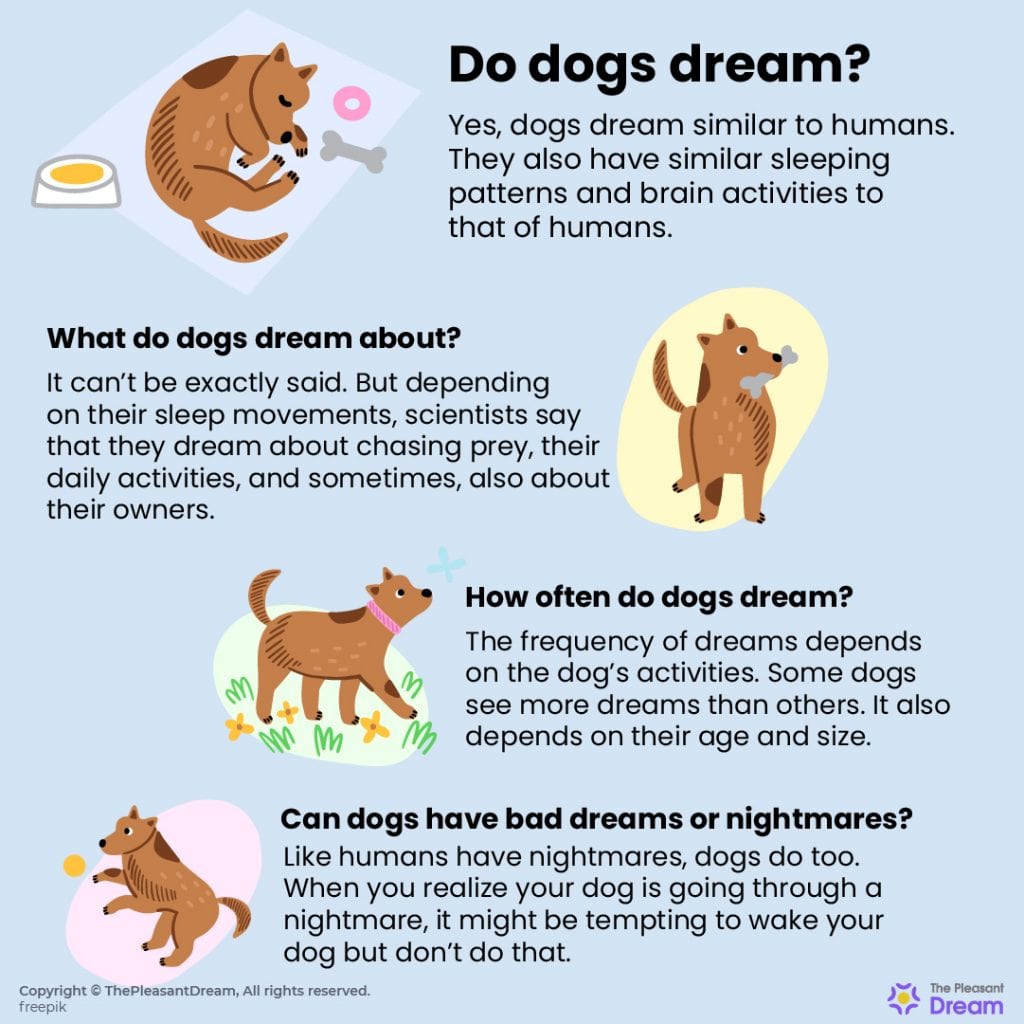Does it ever occur to you: What do dogs dream about?
Like humans, dogs eat, exercise, sleep and cuddle too. They also react to unknown people or unfamiliar situations and get uncomfortable about it.
In fact, if you have a pet dog, you’ll be more interested to know what type of dreams they experience. Do they really hunt rabbits in dreams or do dogs twitch in their sleep? Well, read on to know what the scientists have to say.

Do Dogs Dream?
Scientists believe that dreams are common to humans as well as most vertebrates. Not only that, but even fruit flies dream on a regular basis.
Dogs follow similar sleep cycle patterns as humans. They also experience a wakefulness period, then Rapid Eye Movement or REM sleep, followed by non-rapid-eye-movement sleep.
Understanding with an Experiment
Let us try to understand these sleep patterns and dreams with the help of a very famous experiment involving lab rats. These rats were made to run all day in a maze. Scientists then noted down the brain activity of these rats in the maze and during Rapid eye movement REM sleep.
Both these brain activities were compared. The results concluded that in both the activities the same areas of a rat’s brain lit up. This precisely means that the rats dreamed of running in a maze.
With this experiment, the researchers finally came to the conclusion that animals dream like humans. These animals also dream about their day just like us.
According to the National Sleep Foundation report, dogs spend a major half of the day sleeping. The sleeping time can also be longer for puppies and large dogs or breeds.
What Do Dogs Dream About?
Dogs have many interesting activities to do in a day. Scientists disabled the pons in dogs to find out what they dream about.
What is pons? They are the part of the brainstem that controls our sleep cycles and deep sleep. It also prevents our large muscles from making any movement while we sleep. Hence, we can say that, without the pons, we would be doing literally every movement in reality that we were dreaming of.
It is a common observation that small dogs or puppies and old dogs twitch and move the most while they’re sleeping. Stanley Coren, a columnist on AKC Family dog explains that the pons is not much developed in puppies and have lost their efficiency in old dogs.
To know what the dogs are dreaming about, the researchers temporarily disabled the pons and allowed them to make movements during REM sleep. It turned out that the dog’s sleeping patterns are similar to humans.
So similar to humans, dogs can be dreaming about various things like their daily activities, chasing a cat, running after squirrels, or even about you or other dogs.
Why Do Dogs Dream?
It is a basic concept that dreams help us to process information from our daily lives. When in sleep, you take a pause from your physical activities, dreams give you time to think over your daily affairs and adapt to them. It’s the same for dogs.
This is also one of the reasons why sleep is so important to dogs. Further, dreams also indicate deep sleep which helps dogs grow and repair the body.
How Often Do Dogs Dream?
Dreams depend on the dog’s activities. Some dogs see more dreams than others. It also depends on their age and size.
Dogs process their daily activities in their dreams. As puppies have a lot of new information to process, they dream a lot more in comparison to older dogs.
A toy poodle may dream every 10 minutes whereas a Retriever only dreams once in an hour. The poodle’s dream can last for a minute but Retriever’s dream can last for 5-10 minutes.
This also depends on the amount of sleep needed. Dogs who stay active outside throughout the day experience more sound sleep and longer phases of REM i.e., more time to dream.
Can Dogs Have Bad Dreams or Nightmares?
Like humans have nightmares, dogs do too. When you realize your dog is going through a nightmare, it might be tempting to wake your dog but don’t do that. You might want to comfort your dog and we totally respect your emotions, but there are a few risks attached.
As a human also, when we suddenly wake up from a nightmare, we take a minute to realize where we are and who we are with.
Similarly, dogs can also not be aware of these things and can get aggressive. This can also prove to be dangerous and harmful especially for children.
FAQs about dogs dreams
If you have a dog at home, there’s so much you would want to know, including:
Humans need uninterrupted sleep to survive, so do dogs. Further, the structure of the brains of dogs and humans is very similar. Hence, dogs and humans experience similar brain wave patterns and activity.
When in deep sleep, dogs show some signs like twitching, murmuring, barking or running. These signs indicate they’re dreaming. We cannot know about their exact dream but based on their activity while sleeping, we can predict them.
For instance, if a dog is barking in sleep, he might be running after something in a dream.
Certainly. Dreams are very individualistic in people as well as in dogs. A scientist conducted a study and concluded that small dogs dream frequently but these dreams are of short durations. They can even have 60-second dreams every ten minutes.
On the contrary, large dogs get fewer dreams of a long duration of five minutes also.
Other than that, a dog also dreams of his daily activities. So, we can definitely say that breeds impact dreams. Dobermans will highlight guard behavior because it is specific to his breed. Similarly, Retrievers may only dream of chasing balls for playing.
It is almost impossible to predict the exact dream of your dog. But you can always make appropriate guesses based on the clues.
Dreams occur during REM sleep. REM sleep starts after 20 minutes of sleep and lasts for nearly three minutes. Observe the movements of your dog very carefully during this duration. This is the time when your dog will twitch or make sounds.
Try to find out if there is any similarity in the movements between the dog’s daily activities and dream movements.
Based on such movements, you’ll be able to guess if the dog is chasing something or playing with a friend. If these are parts of their daily activities, you can assume the dogs are dreaming about them.
Yes, you can help your dog have good dreams. How? If the scientific fact that ‘dogs process their day during sleep’ is true, then make every day happy for your dog. This will help them get sweet dreams.
Play with them and give them a happy daytime. Provide them with a comfortable corner to sleep in so they can have the best dreams.
Dogs dream about their everyday experiences like us. So, if you love your dog and spend time with them, your furry little bud is definitely dreaming about you. It can be about your face, smell, or about playing with you.
To increase the chances of dogs dreaming about you, spend more time with them.
In the end,
Dreams are common but if it starts affecting your bud’s health, it’s always wise to seek a vet’s opinion to check if there’s any underlying medical condition.
After all, when these pups give you unconditional love and after a tiring day, welcome you with open arms… it’s only fair if you can give at least some of it in return!
If you want to know ‘What do Cats Dream about?’, then click here.

